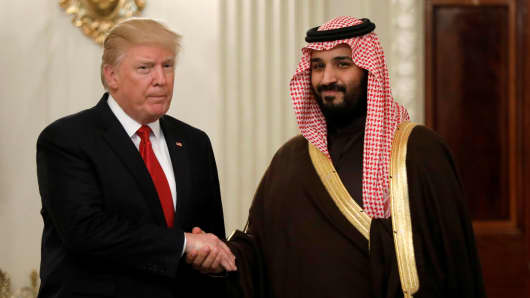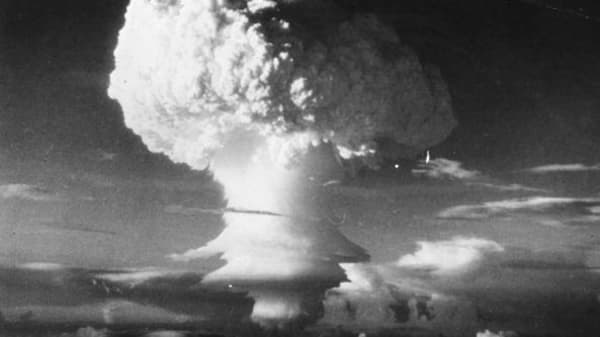But the direct line to these more bellicose moves begins earlier than that and goes directly to the White House. While still deputy crown prince, bin Salman visited with President Trump in March of this year. During that meeting, they publicly declared Iran as the key regional security threat in the Middle East. That was step one.
Step two was President Donald Trump's visit to Saudi Arabia in May. That visit and the Saudi side of that agenda was arranged by bin Salman and was seen as a great triumph for him. The key message from the Trump visit wasn't that the 31-year-old now heir to the throne was good at event planning. The takeaway came from President Trump's green light to the Saudis to use new measures to crack down on terrorism in the Middle East. And the Saudis seem to be taking "terrorism" to specifically mean Iranian-backed terrorism and military forces.
Step three came almost exactly a month after that visit, when bin Salman was made crown prince.
Step four seems to have come in September, when bin Salman reportedly secretly visited Israel to discuss Iran and other potential cooperative measures. Neither country is officially acknowledging that visit took place, but at least one Israeli government source confirmed the meeting last month.
And now we're on the step five, which appears to be a combination of the purge to remove any possible internal hurdles towards a greater anti-Iranian push, and blatant protests against any real or perceived Iranian aggression.
There may be more intermediate steps to come, but we can all see where this is leading. A direct conflict between Saudi Arabia and Iran, as opposed to the proxy war they're fighting in Yemen, looks inevitable.
Speaking of proxy wars, if that direct conflict happens would it make fighting between Saudi Arabia and Iran a U.S. proxy war? The answer seems to be yes, especially when one connects the very clear and sequential dots listed above. The harder question to answer is whether such a war, proxy or not, can be avoided.
The fact is that Iran and the U.S. have been in a state of cold war for almost 40 years. Iran has done almost all of the killing during that period, in terrorist attacks carried out by Iran's proxies including Hezbollah and other armed groups who targeted U.S. troops during the war in Iraq.
But Saudi-Iranian hatred has been even more intense during this same period. They remain the two leading combatants in the centuries-old Sunni-Shia civil war for Islamic supremacy. Iran is the more powerful military player while Saudi Arabia has more cash and control of the Islamic holy sites of Mecca and Medina.
Enter the last two American presidential administrations. First, the Obama team seemed to be giving Iran a major leg up by promoting the nuclear deal with Tehran and -- just as importantly -- working to end many economic sanctions and release up to $150 billion in frozen assets back to the mullahs.
Next, the Trump administration comes in vowing to either nix or radically modify that nuclear deal and bashing Iran in a way no other president ever has. More aggressive anti-Iranian hawks like bin Salman may have seen Donald Trump's election as an excuse to win the day over more dovish princes and ministers. And the White House seemingly gave Saudi Arabia a green light.
Whether the U.S. initiated this or the Saudis took advantage of a new administration, it's not clear where it goes next. Some kind of peace deal or cooperation agreement between the Saudis and the Iranians does not seem very likely. Remember, their dispute goes beyond and long predates America's involvement or seeming favoritism to either side.
But if full blown war breaks out directly between the two countries, it's hard to see the U.S. being able to sit it out without at least some form increased weapons support and other aid. Then it will be up to Iran's possible allies, like Russia and China to make the next move.
None of these scenarios are comforting. But it's important to avoid the naive thought that had President Trump and this new crown prince not come along, relative peace would have been sustainable for much longer. Instead of hand wringing about what may or may not speed up the inevitable, all reasonable parties need to figure out how to make sure two countries destined to confront each other like Iran and Saudi Arabia don't end up fighting a war more deadly and prolonged than what we've seen in Syria and Yemen for the past several years.
Commentary by Jake Novak, CNBC.com senior columnist. Follow him on Twitter @jakejakeny.
For more insight from CNBC contributors, follow @CNBCopinion on Twitter.





